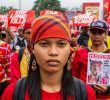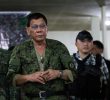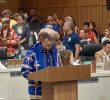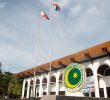CAGAYAN DE ORO CITY, Philippines – The continued attacks on the country’s press community have reached an alarming level, an international media watchdog has noted.
During the conduct of its mission to the Philippines recently, the Committee to Protect Journalists (CPJ) has found “increasing levels of intimidation and a shrinking space for the free press in the country.”
The mission was led by CPJ board chair Kathleen Carroll. Joining her were Peter Greste, director of the Australia-based Alliance for Journalists’ Freedom (AJF), and CPJ Asia program coordinator Steven Butler, who met with local journalists and public officials last week.
From those meetings, CPJ was able to document reports of various types of formal and informal pressure that Philippine journalists face.
The CPJ said it was “extremely concerned” about these actions, citing, for instance, the 11 legal cases against news website Rappler that “appear to be politically motivated” and have “created a sense of fear throughout the media industry, leading to self-censorship.”
“Government officials have repeatedly attacked the press,” the group said in an April 16 statement, adding that the state, through Pres. Rodrigo Duterte, who in his previous speeches, has threatened to withhold the license of the TV network ABS-CBN.
“The oppressive working environment for journalists in the Philippines is alarming,” said Carroll in the same statement, adding, that the Duterte government files case after case against Rappler while the president himself lobs sustained, often personal attacks against individual journalists.
“Online harassment of journalists is highly organized and vicious,” Carroll noted.
CPJ also documented the practice of “red tagging” or accusing media practitioners of being connected or affiliated with the communists, such as in the case of the National Union of Journalists of the Philippines, thereby putting them in jeopardy of attack or arrest.
Smaller news websites covering controversial human rights topics, the committee said, have suffered huge distributed denial of service (DDOS) attacks originating from the Philippines, according to site managers.
Among the victims of DDOS attacks, last December were Bulatlat, Kodao, and Pinoy Weekly, which are members of the Altermidya (People’s Alternative Media Network), a network of independent and progressive media outfits, institutions, and individuals.
“The AJF recognizes the importance of supporting press freedom across the region, and we share CPJ’s concern about what’s happening here,” Greste said.
“Government forces are finding new and increasingly sophisticated ways to shut down press freedom so the attacks on Rappler and others have a chilling effect across all journalists. This is profoundly damaging to the country’s democracy,” Greste added.
Another media organization, Reporters Without Borders (Reporters Sans Frontieres), has also shared its concern with journalists working under threatening and risky conditions in some parts of Asia.
“With totalitarian propaganda, censorship, intimidation, physical violence and cyber-harassment, a lot of courage is needed nowadays to work independently as a journalist in the Asia-Pacific countries, where democracies are struggling to resist various forms of disinformation,” Reporters Without Borders said.
In his past speeches, Duterte has accused some journalists of engaging in “AC-DC” (attack-collect-defend-collect) where media practitioners criticize an opponent of a political personality in exchange for money.
The website Ethical Journalism Network defined AC-DC as “a kind of journalism where the reporter attacks a person in order to collect money from that person’s rival or enemy. The same journalist then defends the person originally attacked, also for a fee.”
“Here in the Philippines, there’s no such thing as investigative journalism. It’s all about the money,” Duterte was quoted as saying. (davaotoday.com)









